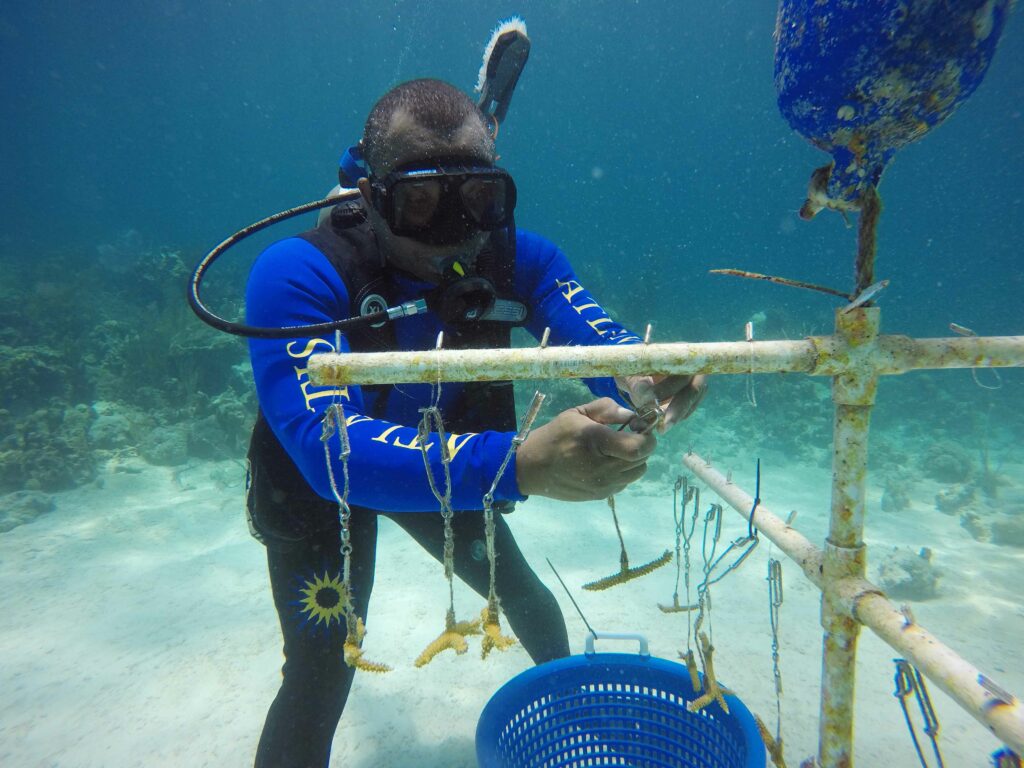A landmark survey of Florida’s nursery-grown corals could provide a blueprint to reverse the decline of coral reefs here in The Bahamas, offering glimmers of hope for some of the nation’s most vulnerable marine ecosystems.
The new research, published in Proceedings of the Royal Society B, showed some strains of the critically endangered staghorn coral (Acropora cervicornis) are better at surviving rising seawater temperatures than others, a breakthrough discovery that could turn the tide on coral loss due to ocean warming.
In the world’s first large-scale census of corals growing in nurseries along the Florida Reef Tract, researchers detected thermally tolerant corals that could survive ocean heat waves of up to 2.57 °C higher than their more sensitive counterparts. Coral nurseries (i.e., coral farms) are used to grow corals quickly in optimal conditions, before pruning them and transplanting their progeny onto struggling reefs. This study compared 229 coral fragments from six different nurseries, paving the way for similar research to take place here in The Bahamas.
“This research and more is showing that some corals can handle temperature stress and temperature changes better than others – and this may be the key to the future of coral reefs in The Bahamas,” said Dr. Craig Dahlgren, co-author on the paper and executive director of the Perry Institute for Marine Science (PIMS), one of ABPF’s key partners in coral restoration.
Scientists plan to tap into the enormous potential of PIMS’ Reef Rescue Network, an initiative that works with partners and recreational divers to restore the coral reefs in the region. The ABPF has been instrumental in expanding the Reef Rescue Network since its inception in 2017, which currently encompasses nearly 30 coral nurseries in The Bahamas alone, making it the country’s largest coral restoration operation. By similarly identifying and growing thermally tolerant corals at home, scientists can improve the survival of nursery-grown coral outplants, and thus improve reef resilience to warming oceans.
“If we can identify these corals in The Bahamas and understand how they are genetically adapted to deal with temperature stress, then we can select corals for restoring reefs that are best adapted to future conditions,” said Dr. Dahlgren.
A diver’s paradise, The Bahamas boasts the third largest barrier reef in the world and some of the last remaining healthy reefs in the Caribbean. The country’s “natural gradient in water temperature will help us identify how corals will respond to a changing climate as well,” he said.

ABPF’s Legacy of Coral Restoration
With their sensational shapes and dazzling array of sea life and colours, Bahamian coral reefs are tourist magnets, food factories and biodiversity wonderlands.
But half of the world’s coral reefs are dead and more than 90% are on track to die by 2050. Ocean warming is accelerating the coral crisis, and rapidly transforming once beautiful coral reefs into white skeletal graveyards. The heartbreaking and widespread decline of coral reefs could spell economic catastrophe for The Bahamas, a nation that relies on reefs for food, income, storm protection and more.
That’s why the ABPF was founded in 2005 – to be part of the climate change solution at home. The ABPF established some of the first-ever coral nurseries in The Bahamas and thanks to the support of ABPF and other partners, the Reef Rescue Network is growing more than 7,000 corals for restoration, and thousands are transplanted onto degraded reefs annually.
In addition to a lengthy history in supporting coral restoration, the ABPF ensures Atlantis maintains a plastic-free environment, where every marine interaction that guests participate in goes towards funding conservation projects to preserve marine life around The Bahamas.
“Right now, Atlantis has no single-use plastics such as water bottles, plastic utensils, or take-out containers or plastic bags,” said Michelle Liu, Atlantis senior vice president of marine operations in an interview with Cheddar News. “Every little bit counts.”

